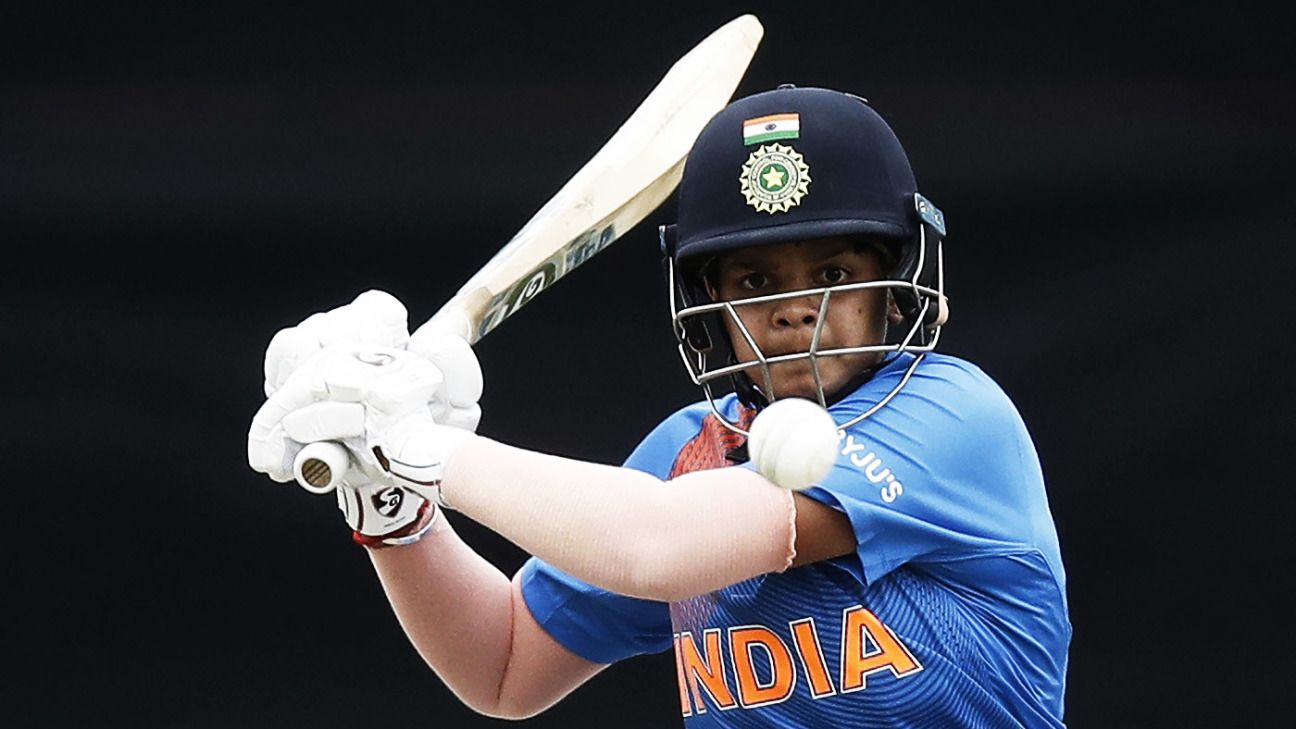“That’s how she plays. That’s her strength. That’s her style of batting,” Raj, India’s Test and ODI captain, said on match eve in Bristol. “There would be times she would give us head starts. We would love that [and for] her to be consistent. At the same time, she’s a young kid. She will learn with experience and with more matches she’ll also understand how to build an innings also.
“Since she’s getting into playing the one-day series for the first time, I, as the captain, would always encourage her to play the way she enjoys playing and is comfortable playing. That’s the style of batting she should do.”
Verma, 17, made 96 and 63 on Test debut last week in the tour-opening one-off Test against England, becoming the youngest batter to score twin fifties on debut in women’s Tests. Prior to that, she had played only in 22 T20Is, partnering Smriti Mandhana in the opening combination in all of those matches, having debuted in September 2019.
Since the 2017 ODI World Cup, India have tried out several opening partners for Mandhana, all right-handers, including Jemimah Rodrigues, Punam Raut, Priya Punia, with varying degrees of success. However, either inconsistency – as has been the concern with Rodrigues in the recent past – or the inability to make runs at a brisk rate – a long-standing talking point around the batting styles of both Punia and Raut – have denied India a chance at identifying a long-term pick.
Only 36.33% of bat runs by India players since the 2017 World Cup have come from their Nos. 4, 5, 6, and 7 while the top three have made 55.73% of the overall tally. Crucially, 21.03% of India’s team runs have come before they’ve lost the first wicket. Verma’s adventurous style could skew that, but Raj said she would find the support needed to blossom in the 50-over game.
“We as experienced batters in the middle order, if we lose an early wicket, we are there to compensate and build an innings,” Raj said. “So if she gives us a great start, we’ll take it from there. Our team does have the batting depth wherein everyone has a different role to play. So we look forward to sticking to that role and give our best in playing that role.”
Much of India’s success with the bat outside their openers would depend on Raj, who, having kicked off her international career as an opener 22 years to the day, has largely played at No. 3 since. In the ODI series against South Africa at home in March, which India lost 1-4, she batted at Nos. 4, and 5. Raut came in at one-down in all of those matches, while Harmanpreet Kaur batted ahead of Raj, at No. 4 in the fifth match.
“Healthy competition is always good in the team,” Raj said, smiling. “Having said that, we picked the team based on composition again and I would say that’s important and the girls would also understand that.
“There are times when we go with an extra seamer depending on the wicket, at times we go with a spin-dominant bowling attack. So, accordingly, we try and see into our batting order and depth as well. With the equation of the allrounders coming in, we’ll definitely look into it, yes. We do have a few options, but we will select based on what composition the team is looking at getting into tomorrow’s game.”
The ODI series marks India’s first assignment in the format in the UK since their nine-run defeat to the hosts in the final of the 2017 ODI World Cup. With the next edition of the world tournament due in under nine months, Raj aims to lead the side back to winning ways after a below-par performance in the series against South Africa.
“The biggest thing we’d want the team to do is have a very strong mindset because we can’t really compare the series [to the one against South Africa in March],” Raj said. “Yes, we lost the home series but the conditions are very different at home and in England, so we can’t have the same approach.
“But yes, we’d definitely look into having a more positive intent, whether it’s our batting or bowling attack, and we have been working on our fielding. Right now it’s important that whatever strategies or whatever we tried to work on in our training sessions, we carry them into the match and be consistent at that.”
“[…] I think our preparation has definitely started but it’s important that when we get into a series we look to win,” she said when asked when asked if conditions in New Zealand, where the 2022 ODI would be played, could have any similarity with those in England. “Yes, we consider that also as a gameplan for the core players or the combination we would like to try or look at in the run-up to the World Cup.
“Having said that, it’s important for us to win a series because the last series didn’t go well for the team and as the captain I would like the team to get back to winning ways.”
Annesha Ghosh is a sub-editor at ESPNcricinfo. @ghosh_annesha
